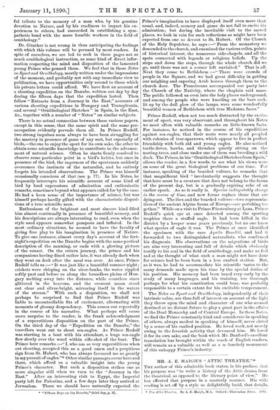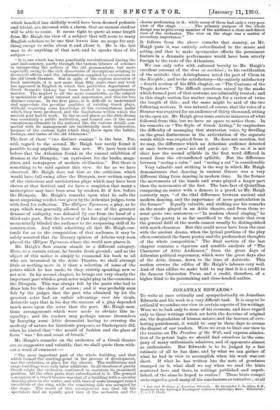MR. A. E. HAIGH'S " ATTIC THEATRE."*
THE author of this admirable book states, in his preface, that his purpose was "to write a history of the Attic drama from the theatrical, as opposed to the literary point of view." He has effected that purpose in a masterly manner. His wide reading is set off by a style so delightfully lucid, that details,
• The Attic Theatre. By A. E. Haigh, M.A. Oxford : Clarendon Press. 1889.
which handled less skilfully would have been deemed pedantic and trivial, are invested with a charm that no earnest student will be able to resist. It seems right to quote at some length from Mr. Haigh his view of a subject that will seem to many ,English scholars to be one that leaves him no scope for any- thing except to write about it and about it. He is the last man to do anything of that sort, and he speaks thus of his subject :-
" It is one which has been practically revolutionised during the past half-century, partly through the various labours of scholars in interpreting the notices of the old grammarians, but more especially owing to the rich discoveries of inscriptions relating to theatrical affairs, and the information supplied by excavations in the old Greek theatres. But in spite of the copious accession of fresh materials, it is now more than fifty years since any work has appeared in English in which this particular department of Greek dramatic history has been treated in a comprehensive manner. The neglect is all the more remarkable, as the subject is undeniably of great interest and importance, and this for two distinct reasons. In the first place, it is difficult to understand and appreciate the peculiar qualities of existing Greek plays, without acquiring some knowledge of the circumstances under which they were produced, and the limitations within which the ancient poet had to work. In the second place, as the Attic drama was essentially a public institution, and formed one of the most conspicuous elements in the national life, the various details con- nected with its management are incidentally most instructive, because of the curious light which they throw upon the habits, feelings, and tastes of the old Athenians."
The first of these " two distinct reasons " is the best. For, with regard to the second, Mr. Rath has- rarely found it possible to say anything that was new. We have been told before that the Athenian found, in the annnal exhibition of dramas at the Dionysia, " an equivalent for the books, maga- zines, and newspapers of modern civilisation." But there is something to be said against this view. So far as we have observed, Mr. Haigh does not hint at the criticism, which would have full swing after the Dionysia, over written copies of the victorious and unvietorious plays which may have been shown at that festival, and we have a suspicion that many a masterpiece may have been seen by readers, fit if few, before the Dionysia. Mr. Haigh's remarks upon what he calls the most surprising verdict ever given by the Athenian judges, teem with food for reflection. The IrEdipus Tyrannus, a play, as he says, which was generally allowed to be one of the greatest dramas of antiquity, was defeated by one from the hand of a third-rate poet. But the horror of that fine play's catastrophe momentarily blinded the audience to the surpassing skill of its construction. And while admitting all that Mr. Haigh con- tends for as to the composition of that audience, it may be safely asserted that the literary opinion of Athens very soon placed the CEdipus Tyrannus where the world now places it. Mr. Haigh's first reason stands in a different category.
Here, to a certain extent, he breaks fresh ground ; and as the object of this notice is simply to commend his book to all who are interested in the Attic Theatre, we shall attempt little or nothing more in it than a selection of some of the points which he has made, be they, strictly speaking, new or not new. In his second chapter, he brings out very clearly the important part which a great actor might play in the contests at the Dionysia. This was always felt by the poets who had to draw lots for the choice of actors ; and it was probably soon felt by the judges that the poet who obtained by lot the greatest actor had an unfair advantage over his rivals.
Aristotle says that in his day the success of a play depended much more upon the actor than the poet. Mr. Haigh men- tions arrangements which were made to obviate this in- equality; and his readers may perhaps amuse themselves by fancying some Attic dramatist having to overstep the modesty of nature for histrionic purposes, as Shakespeare did, when he hinted that " the mould of fashion and the glass of form " was " fat and scant of breath."
Mr. Haigh's remarks on the orchestra of a Greek theatre are so suggestive and valuable, that we shall quote them with- out a word of comment :—
" The most important part of the whole building, and that which formed the starting-point in the process of development, was the orchestra, or place for the chorus. The-auditorium and stage buildings were only later additions. In all theatres of purely Greek origin the orchestra continued to maintain its prominent position. All the other parts were subordinated to it. The general conception of a Greek theatre was that of a building with a circular dancing-place in the centre, and with tiers of seats arranged round -two-thirds of the ring, while the remaining side was occupied by the stage. The result of this arrangement was that all the spectators had an equally good view of the orchestra and the chorus performing in it ; while many of them had only a very poor view of the stage The primary purpose of the whole design was to give every member of the audience a clear and direct view of the orchestra. The view on the stage was a matter of secondary importance."
It follows from the above remarks that scenery, as Mr. Haigh puts it, was entirely subordinated to the music and acting, and that to make spectacular effects the prominent feature in a dramatic performance would have been utterly foreign to the taste of the Athenians.
We can only refer with enforced brevity to Mr. Haigh's excellent account of the dens ex machind ; to his rectification of the mistake that Aristophanes acted the part of Cleon in the Knights ; and to the satisfactory—the entirely satisfactory —fourth section of his fifth chapter, on " The Costume of the Tragic Actors." The difficult questions raised by the masks which formed part of that costume, are admirably treated ; and in this single section lies matter enough for a review of twice the length of this ; and the same might be said of the two following sections. It was natural, of course, that the voice of a Stentor was required for an audience of thirty thousand, sitting in the open air. Mr. Haigh gives some curious instances of what followed from this, but we have no space to notice them. In his remarks on " The Style of Greek Acting," he emphasises the difficulty of managing that stentorian voice, by dwelling on the great distinctness in the articulation of the separate words which was required from it. He does not mention, but we may, the difference which an Athenian audience detected
at once between war; opi and 76e7ti o Opel To ns it is not clear how the second syllable in the first word differed in
sound from the circumflexed syllable. But the difference between " seeing a calm " and " seeing a cat " is considerable Very valuable and striking is the way in which Mr. Haigh demonstrates that dancing in ancient Greece was a very different thing from dancing in modern time. In the former the movements of the hands and arms played a larger part than the movements of the feet. The bare fact of Quintilian comparing an orator =with a dancer, is a proof, as Mr. Haigh correctly says, " of the vital difference between ancient and modern dancing, and the importance of mere gesticulation in the former." Equally valuable and striking are his remarks on the music played in an Attic theatre, and from them we must quote two sentences :—" In modern choral singing," he says, "the poetry is so far sacrificed to the music that even the general drift of the words cannot usually be distinguished with much clearness. But this could never have been the case with the ancient drama, when the lyrical portions of the play often contained the finest poetry and the profoundest thoughts of the whole composition." The final section of the last chapter contains a vigorous and sensible analysis of "The Character of Attic Audiences," from the great days of Athenian political supremacy, which were the great days also of the Attic drama, down to the time of Aristotle. This section crowns the edifice of Mr. Haigh's labours very well. And of that edifice we make bold to say that it is a credit to the famous Clarendon Press, and a credit, therefore, of a higher kind to its painstaking and clear-headed author.







































 Previous page
Previous page